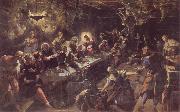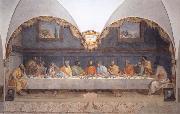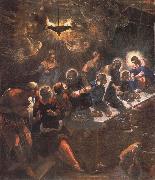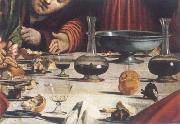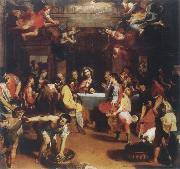Wholesale Oil Painting No Minimum |
|||||||||||
|
|
|||||||||||

|
|||||||||||
|
|
|
||||||||
TintorettoItalian Mannerist Painter, ca.1518-1594 His father was a silk dyer (tintore); hence the nickname Tintoretto ("Little Dyer"). His early influences include Michelangelo and Titian. In Christ and the Adulteress (c. 1545) figures are set in vast spaces in fanciful perspectives, in distinctly Mannerist style. In 1548 he became the centre of attention of artists and literary men in Venice with his St. Mark Freeing the Slave, so rich in structural elements of post-Michelangelo Roman art that it is surprising to learn that he had never visited Rome. By 1555 he was a famous and sought-after painter, with a style marked by quickness of execution, great vivacity of colour, a predilection for variegated perspective, and a dynamic conception of space. In his most important undertaking, the decoration of Venice's Scuola Grande di San Rocco (1564 C 88), he exhibited his passionate style and profound religious faith. His technique and vision were wholly personal and constantly evolving. |
||||||||
|
|
||||||||
The communion
The communion Painting ID:: 38515 |
mk137
1592-1594 oil on linen 365x568cm San Giorgio Maggiore, Venice mk137 1592-1594 oil on linen 365x568cm San Giorgio Maggiore, Venice |
|||||||
|
|
||||||||
ALLORI AlessandroItalian Mannerist Painter, 1535-1607 Born in Florence. After the death of his father in 1540 he was brought up and trained in art by a close friend, often referred to as his 'uncle', the mannerist painter Agnolo Bronzino, whose name he sometimes assumed in his pictures. In some ways, Allori is the last of the line of prominent Florentine painters, of generally undiluted Tuscan artistic heritage: Andrea del Sarto worked with Fra Bartolomeo (as well as Leonardo Da Vinci), Pontormo briefly worked under Andrea, and trained Bronzino, who trained Allori. Subsequent generations in the city would be strongly influenced by the tide of Baroque styles pre-eminent in other parts of Italy. Freedburg derides Allori as derivative, claiming he illustrates "the ideal of Maniera by which art (and style) are generated out of pre-existing art." The polish of figures has an unnatural marble-like form as if he aimed for cold statuary. It can be said of late phase mannerist painting in Florence, that the city that had early breathed life into statuary with the works of masters like Donatello and Michelangelo, was still so awed by them that it petrified the poses of figures in painting. While by 1600 the Baroque elsewhere was beginning to give life to painted figures, Florence was painting two-dimensional statues. Furthermore, in general, with the exception of the Contra Maniera artists, it dared not stray from high themes or stray into high emotion. |
||||||||
|
|
||||||||
|
|
The communion
The communion Painting ID:: 45493 |
mk186
1582 Florence, Stanta Maria del Carmine mk186 1582 Florence, Stanta Maria del Carmine |
||||||
|
|
||||||||
CLEVE, Joos vanFlemish Northern Renaissance Painter, ca.1485-1540 |
||||||||
|
|
||||||||
|
|
The communion
The communion Painting ID:: 45497 |
MK186
around 1530 Paris muse you Louvre MK186 around 1530 Paris muse you Louvre |
||||||
|
|
||||||||
TintorettoItalian Mannerist Painter, ca.1518-1594 His father was a silk dyer (tintore); hence the nickname Tintoretto ("Little Dyer"). His early influences include Michelangelo and Titian. In Christ and the Adulteress (c. 1545) figures are set in vast spaces in fanciful perspectives, in distinctly Mannerist style. In 1548 he became the centre of attention of artists and literary men in Venice with his St. Mark Freeing the Slave, so rich in structural elements of post-Michelangelo Roman art that it is surprising to learn that he had never visited Rome. By 1555 he was a famous and sought-after painter, with a style marked by quickness of execution, great vivacity of colour, a predilection for variegated perspective, and a dynamic conception of space. In his most important undertaking, the decoration of Venice's Scuola Grande di San Rocco (1564 C 88), he exhibited his passionate style and profound religious faith. His technique and vision were wholly personal and constantly evolving. |
||||||||
|
|
||||||||
|
|
The communion
The communion Painting ID:: 45621 |
mk186
1592-94 Venice church San Giorgio Maggiore mk186 1592-94 Venice church San Giorgio Maggiore |
||||||
|
|
||||||||
ROMANINOItalian painter, Brescian school (b. ca. 1484, Brescia, d. ca. 1559, Brescia). |
||||||||
|
|
||||||||
|
|
The communion
The communion Painting ID:: 45632 |
mk186
1557/58 Montichiari, parish church mk186 1557/58 Montichiari, parish church |
||||||
|
|
||||||||
Domenico GhirlandaioItalian 1449-1494 Domenico Ghirlandaio Galleries Painter, mosaicist and possibly goldsmith. He was head of one of the most active workshops in late 15th-century Florence. He developed a style of religious narrative that blended the contemporary with the historical in a way that updated the basic tenets of early Renaissance art. Domenico documented material situation |
||||||||
|
|
||||||||
|
|
The communion
The communion Painting ID:: 45633 |
mk186
around 1476 Passignano, abbey mk186 around 1476 Passignano, abbey |
||||||
|
|
||||||||
Domenico GhirlandaioItalian 1449-1494 Domenico Ghirlandaio Galleries Painter, mosaicist and possibly goldsmith. He was head of one of the most active workshops in late 15th-century Florence. He developed a style of religious narrative that blended the contemporary with the historical in a way that updated the basic tenets of early Renaissance art. Domenico documented material situation |
||||||||
|
|
||||||||
|
|
The communion
The communion Painting ID:: 45684 |
mk186
around 148 Florence, Refektorium of the cloister Ognissanti mk186 around 148 Florence, Refektorium of the cloister Ognissanti |
||||||
|
|
||||||||
Federico BarocciItalian Mannerist/Baroque Era Painter, ca.1535-1612 |
||||||||
|
|
||||||||
|
|
The communion
The communion Painting ID:: 45688 |
mk186
1580 Urbino, cathedral mk186 1580 Urbino, cathedral |
||||||
|
|
||||||||
|
Federico Barocci Italian Mannerist/Baroque Era Painter, ca.1535-1612 The communion mk186 1580 Urbino, cathedral |
||||||||
|
|
||||||||
|
Prev Next
|
||||||||
|
|
||||||||
|
Related Paintings to Federico Barocci :. |
||||||||
|
|
||||||||
|
CONTACT US |
